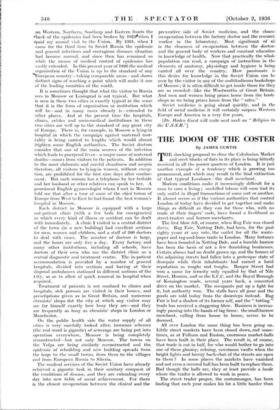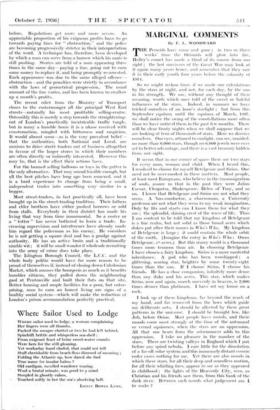THE DOOM OF THE COSTER
By JAMES CURTIS
THE shocking proposal to close the Caledonian Market and erect blocks of flats in its place is being bitterly received in all the poorer quarters of London. It is just another example of a tendency which is growing too pronounced, and which may result in the final extinction of that typical Londoner—the stall merchant.
Modern conditions make it increasingly difficult for a man to earn a living ; unskilled labour will soon find its only outlet in illegal transactions of some sort or another: It almost seems as if the various authorities that control London of today have decided to get together and make things as difficult as they can for those who, with no trade at their fingers' ends, have found a livelihood as street-traders and barrow-merchants.
The first blow fell, of course, when Rag Fair was closed down: Rag Fair, Notting Dale, had been, for the Past eighty years at any rate, the outlet for all the waste- paper and rag-and-bone trade in London: 'Many fortunes have been founded in Notting Dale, and a humble barrOV/ has been the basis of not a few flourishing busineases. Certain abuses had no doubt grown up, and the houses of the adjoining streets .had fallen into a grotesque' state of disrepair while their inhabitants 'had earned a lurid reputation as roughs and toughs. Bangor Street had won a name for ferocity only equalled by that of Nile Street, Hoxton, and so the L.C.C. and the Royal Borough of Kensington made, several years back, a concerted drive on the market. The occupants put up a fight for it, but authority won. The stalls have all gone and the goods are sold today from the doorsteps instead. Rag Fair is but a shadow of its former self, and the " totting " trade has received a staggering blow. Business -is increas- ingly passing into the hands of big firms ; the small barrow merchant, calling from house to house, seems to be' doomed.
- All over London the same thing has been going on. Little street markets have been- closed down, and -some- times, as at Fulham and Euston, enormous market-halls have been -built in their - place. • The result -is, of course, that trade is cut in half, for who would bother to go into' one of these gloorny, echoing, cavernous. vaults when the bright lights and breezy back-chat of the streets are open to them ? In some places the markets have vanished and not even a covered hall has been Wilt to replace them. Bad though- the halls are, they at' least provide a, locale where the trader is allowed to work in peace.
The street trader- proper, the costermonger, has been finding that each year makes his lot a little harder than before. Regulations get more and more severe. An appreciable proportion of his exiguouS profits have to go towards paying fines for " obstruction," and the police are becoming progressively stricter in their interpretation of the word.• A technique has, therefore; been developed by which a man can serve from a barrow which his mate is still pushing. Stories are told of a man appearing three times in the same day—paying a fine, going out to earn some money to replace it, and being promptly re-arrested. Each appearance was due to the same alleged offence- obstruction—and the penalties were strictly in accordance with the -laws of geometrical progression. The usual amount of the fine varies, and has been known to swallow Up a month's profits.
The recent edict from the Ministry of Transport closes to the costermonger all the principal West End streets—naturally his most profitable selling-centre. Ostensibly this is merely a step towards the straightening- out of London's practically inextricable traffic tangle, but in many a humble home it is a ukase received with consternation, mingled with bitterness and suspicion. It would almost seem—as is the very prevalent belief— that the authorities, both National and Local, are anxious to drive street traders out of business altogether in favour of the larger stores in which their members are often directly or indirectly interested. However this may be, that is the effect their actions have.
For the banned selling balloons or toys in the gutter is the only alternative. That may sound feasible enough, but all the best pitches have long ago been annexed, and it is a hard experience to change from being a small, independent trader into something very similar to a beggar.
Most street-traders, in fact practically all, have been brought up in the street-trading tradition. Their fathers and elder brothers have either pushed barrows or sold from stalls. Everybody in their district has made his living that way from time immemorial. So a coster or a " totter " has never bothered to learn a trade. In- ereasing supervision and interference have already made him regard the policeman as his enemy. He considers he is not getting a square deal.and has a grudge against authority. He has an active brain and a traditionally nimble wit; it will be small wonder if wholesale recruiting into the army of crime does take place.
The Islington Borough Council, the L.C.C. and the whole body politic would have far more reason to be proud of themselves if, instead of closing down Caledonian Market, which amuses the bourgeois as much as it benefits humbler citizens, they pulled down the neighbouring gaol at Pentonville and built their flats on that site. Better- housing and ample facilities for a poor, but enter- prising, man to earn an honest living are signs of a healthy social system—which will make the reduction of London's prison accommodation perfectly practical.











































 Previous page
Previous page